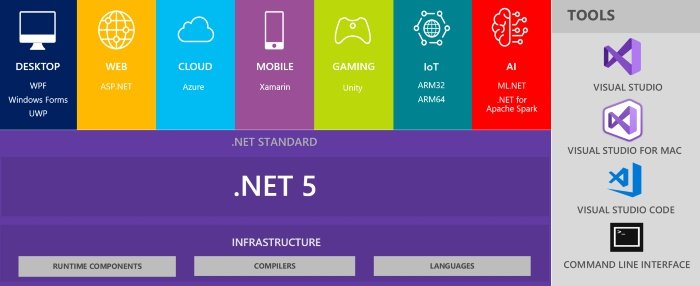Microsoft has announced the general availability of the .NET 5 environment. With .NET 5, Microsoft is building unified implementation for all application types, including console apps, class libraries, cloud services, websites, or desktop applications. In this release, Microsoft has made some improvements for cross-platform development. They have added a new set of framework names with all the APIs in .NET 5 and many Windows-specific APIs.

Microsoft introduces .NET 5
Microsoft has also added a new set of analyzers to analyze your code as you are typing in the IDE. They will make sure that the code you have written will fully remain cross-platform, and you will also be able to write applications that run on lower versions of an operating system. In comparison, you will also still be able to call APIs we have introduced in newer versions. Microsoft wants you to be productive in your IDE and write the code you want to write, including native operating system APIs.
“We’re excited to release .NET 5.0 today and for you to start using it. It’s a major release — including C# 9 and F# 5 — with a broad set of new features and compelling improvements. It’s already in active use by teams at Microsoft and other companies, in production and for performance testing,” Microsoft said.
What is it that Microsoft is trying to achieve with the introduction of .NET 5?
In .NET 5, .NET Standard and .NET Core are merged into a single, unified concept called .NET. Before this, .NET Stanard was nothing but the API specification, and .NET Core was only responsible for implementing that API specification.
With .NET 5, Microsoft is moving towards a unified implementation. Meaning, every single time Microsoft adds a new API, you as a developer can immediately use it on all the application types that .NET 5 including console apps, class libraries, web services, cloud services, desktop apps, and more.
Microsoft is already working on .NET 6
Starting .NET 6, Microsoft is moving to enable the Xamarin side of the house to support iOS and Android development. Meaning, you can share code as quickly as you could before with .NET Standard. However, you will no longer have to wait until all the other platforms catch up and implement the standard.